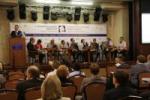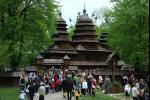- عربي
- Ukraine
- Economy
-
Investment
- Current Investment Trends
- Legal Conditions of Doing Business
- Investment Policy
- Competition
- Setting a Business in Ukraine
- Mergers and Acquisitions
- Taxation
- Import and Export
- Banks and Bank Regulation
- Convertibility and Profits Repatriation
- Currency Regulation
- Protection of Intellectual Property Rights
- Companies
- Travel to Ukraine
- About us
- Useful Sites
- Gallery
- News
Currency rates in UAH
| AED | ||
| BHD | ||
| EGP | ||
| KWD | ||
| LBP | ||
| OMR | ||
| QAR | ||
| SAR | ||
| SYP |
2015-07-06
| Kiev |  |
+32 |
| Donetsk |  |
+28 |
| Dnipropetrovsk |  |
+31 |
| Lviv |  |
+31 |
| Odessa |  |
+27 |
Cossacks
The first written mention of Cossacks appeared in the late 15th century. The appearance of Cossacks played an outstanding part in the historical fate of
In the middle of the 16th century the Cossacks created their own military-political organization: Zaporizhian Sich. It had the original military-administrative system based on the principles of Cossack democracy. The Cossacks founded specific political institutions such as: institutions of military councils, the Zaporizhian Army Kish as the higher executive-legislative organs, and their own legal proceedings.
The Cossacks were a rather bold and numerous organization. K. Kosynskyi and S. Nalyvaiko led the Cossacks in the first great revolts. They took fortresses, liberated towns and villages, and their law became firmly established in the Kyiv, Volyn and Bratslav provinces. Among other great Cossack leaders were Taras Fedorovych, Pavlo But, Yakiv Ostrainyn, Dmytro Hunia.
In 1633 the Polish government, influenced by the revolts, legalized the existence of the Orthodox Church (of which Petro Mohyla was the Metropolitan), and in 1638 the
The defeats of the Cossack rebellions of the 16th to early 17th century made the grave position of Ukrainians worse. Cossack leaders and thousands of rebellious Cossacks and peasants were annihilated and their lands were redistributed. The "gold tranquillity" which prevailed in the early part of the 17th century proved the tranquillity only for Polish magnates and squires who had not obtained lessons from the events of the late 16th and early 17th centuries. Gradual accumulation of force before the decisive conflict with the powerful state machine of Rich Pospolyta took place in Ukrainian society.



